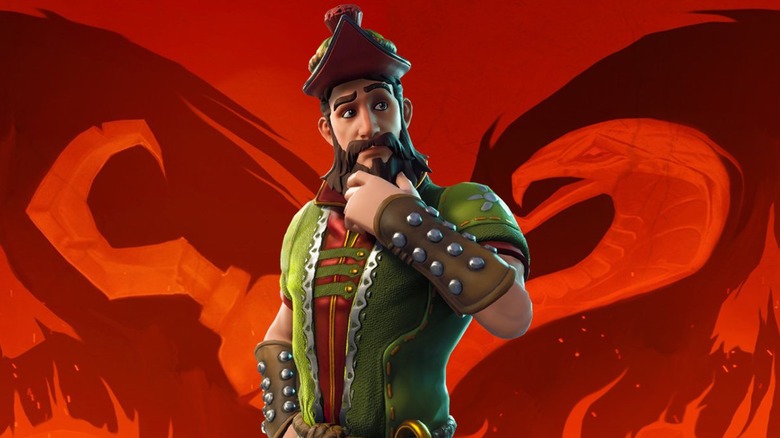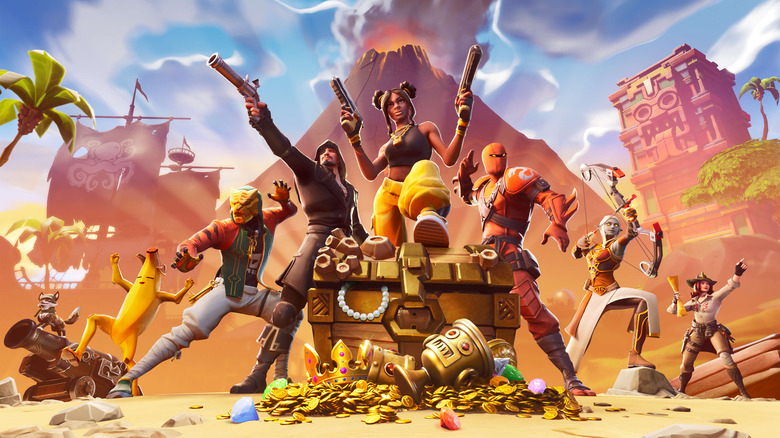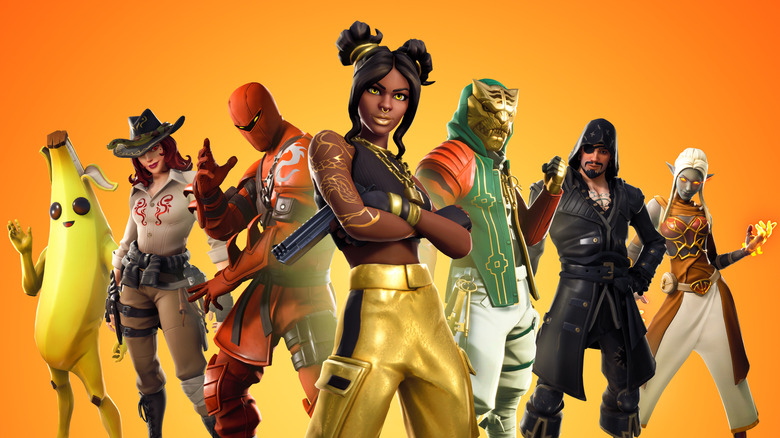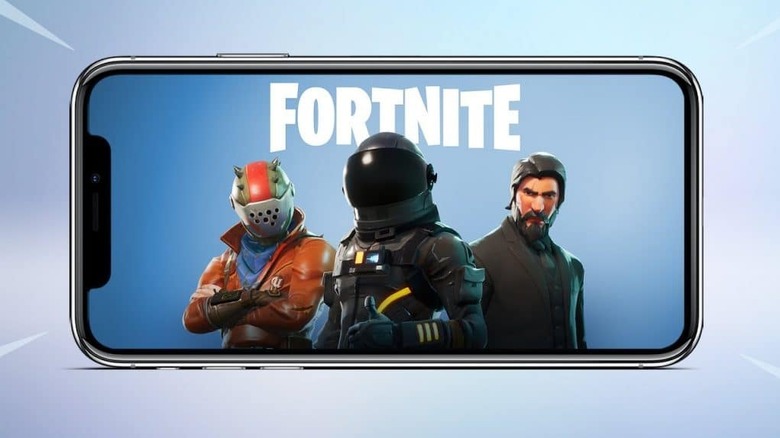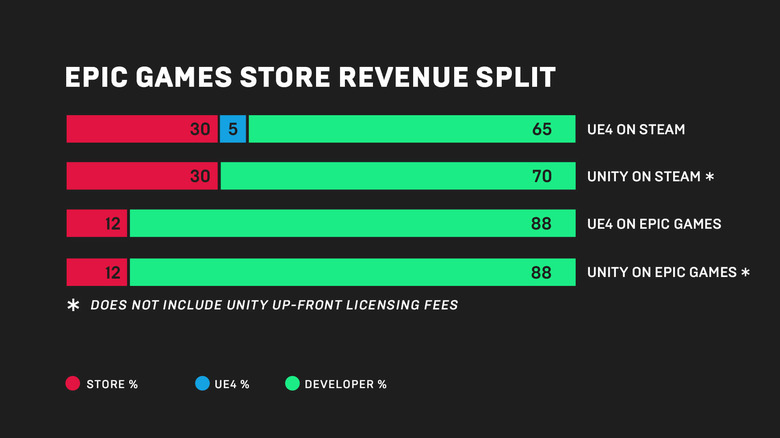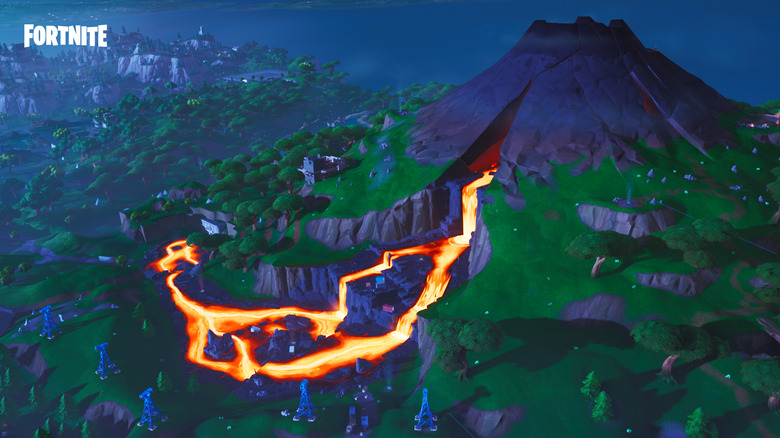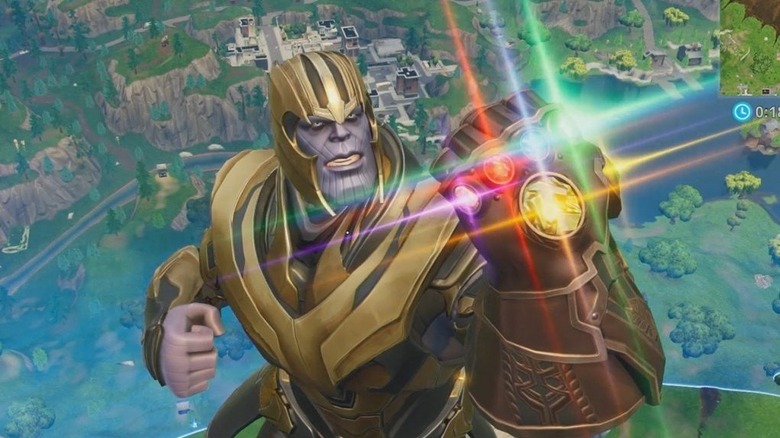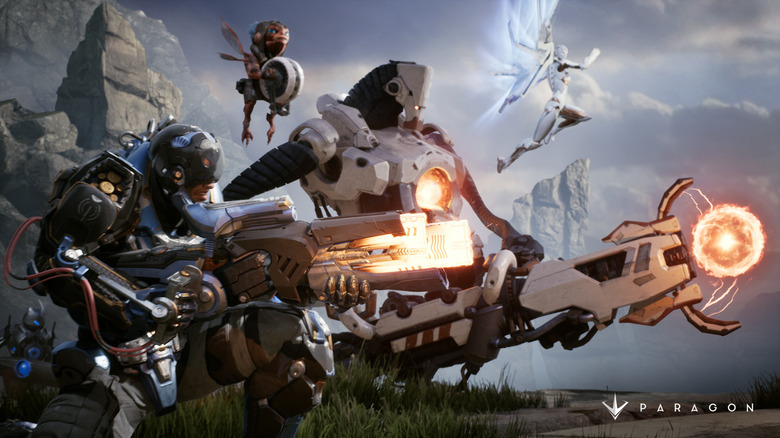Why You'll Never Get To Play Fortnite 2
Everyone and their grandmother seems to have jumped on the Fortnite craze at one point or another. The Fortnite playerbase could create its own sizable nation: there are almost 250 million players gunning for Victory Royales. The battle royale formula has captured the attention — and wallets — of gamers everywhere. Fortnite made nearly $2.5 billion in 2018, which says a lot for a game that is technically free to play. All those V-bucks shelled out for exclusive skins really add up, apparently.
With this bombastic success in mind, it would make sense for Epic Games to make the most of the good name of Fortnite and turn the game into an empire: Fortnite sequels are surely on the way, right? Wrong. There are a myriad of reasons why you will never see a sequel to Fortnite, and it's not because Epic Games is worried about sequelitis.
Games as service
The video game industry has evolved since the advent of updates. You can still stroll down to your retail location of choice and buy a game case and all, but once you get home and pop it in the console, the downloading begins. And there will be more downloading later when patches, updates, and DLC are inevitably released. No longer are games just a one-and-done product; the industry would rather refer to them as "services."
Essentially, developers milk the game — and players — for as long as possible by adding extras that will increase the lifespan of the game. This is meant to ensure that the game will stay relevant longer than it takes to get through the main campaign, and maybe even entice players to spend even more money than they originally dropped for the base package. Electronic Arts, naturally, has claimed to be a leader in this practice. They design their games so that the cash flow continues long after launch. Developers are more likely today to make new "episodes" or DLC or add in-game modes than dedicate time, talent, and money to full-fledged sequels.
Epic Games is more likely to work on updates and in-game purchases in the Fortnite that 250 million players already know and love rather than think about Fortnite 2.
The seasons keep things fresh
Epic Games hasn't abandoned Fortnite. Far from it, in fact: the game is constantly evolving and changing, which keeps things fresh for players. Those who popped in when Fortnite fever was first gripping the gaming world will find that the game is fairly different now. The battle royale concept remains at the core of the game, but each season brings new surprises and challenges.
Every season of Fortnite — which lasts approximately two months — adds in new content and the chance to start fresh. Everyone starts at the same level, working their way through new challenges and finding new aspects added to the map. Each season has its own theme and a sliver of story to tell. The trailers are like mini-cinematics, telling the tale of the ever-changing map and teasing new skins and items players can look forward to. Season 7 during the holiday season came with the tagline "You better watch out," while Season 8 hints to players that "X marks the spot." Season 8 is aptly pirate- and ninja-themed, bringing up memes long dead and bringing back players tired of the snow and ice of Season 7.
Will it be the future?
We mentioned earlier that EA is definitely a fan of the "games as service" approach to developing games these days, but they are far from alone in embracing this concept. Activision Blizzard's value has gone up significantly as a result of making games with continual content like Overwatch and Call of Duty: Black Ops 4, which ditched the usual inclusion of a single-player campaign. The company may have been steered toward this model from experiencing the lucrative success of mobile gaming: after acquiring Candy Crush creator King, Activision Blizzard saw a 94% increase in digital profits.
But this isn't to say that all games will be littered with microtransactions and come with seasons instead of sequels. It costs a lot of money and takes a lot of time to make AAA games, but that effort pays off. 2018 is a testament to the fact that the usual model of one-and-done games with massive, single-player campaigns is still successful. The sun has not yet set on the days of long campaigns, but it's safe to say we will see more games being milked for all their worth well after release.
Like Fortnite. Fortnite is practically tailored for the "games as service" model with small updates and additions making more money than a full-fledged sequel might. Fortnite isn't a God of War, because when it comes to Fortnite, players are never really done with the game. And that's something that Epic Games is counting on.
Fortnite is still huge and profitable
Fortnite, as it turns out, wasn't a fad. Sure, we don't have mainstream news articles coming out about "Fortnite addiction" anymore, but people are still playing the game. More people than ever, in fact. Even with new games like Respawn's Apex Legends garnering attention and maybe stealing some players, Fortnite reached an all-new high of concurrent players in February of 2019. The Saturday after Valentine's Day saw 7.6 million lonely hearts dropping onto the map.
Although technically incorrect, many people are still calling Fortnite the "biggest game in the world," and for good reason. People also wonder if Epic Games could replicate the perfect storm of success in a sequel title. Maybe they could, but why should they? Right now, there is no drive to make a new Fortnite. People enjoy the current one just fine. The Fortnite fever doesn't need to be reignited when there is stable, sustained growth for Epic to celebrate. Fortnite has earned Epic Games over $4 billion and made the founder and CEO Tim Sweeney a billionaire. Why put that money into an unnecessary sequel, and risk halving the current Fortnite playerbase?
Free for now, more free in the future
So Fortnite is hugely profitable. The game is also free. Epic Games has appeared to make a connection between these two factors and have moved to embrace the idea that free games pay off in the long run. If ever there was a Fortnite 2, we would bet that it would be free to play, but that's just a theory. We know for a fact, however, that Epic Games is moving to make more games free to players than ever before.
All of those millions of players who installed Fortnite now have access to the Epic Games Store, an online marketplace set to possibly rival Steam. Epic seems to be aiming to entice developers by taking a smaller cut than Steam does, collecting only 12% of revenue rather than 30%. The Epic Games Store is also doing its best to appeal to players by making games free: every two weeks, the platform puts games like Super Meat Boy and Subnautica up for free. This is the next big thing for Epic Games, rather than a follow up to Fortnite. With these two ventures alone, Epic Games is making an epic name for itself.
Following in the footsteps of Minecraft
Remember Minecraft 2? The wildly successful game that made Microsoft even more money than its predecessor? Of course you don't, because there is no sequel to Minecraft. Despite the fact that the game was released back in 2009, it has stayed incredibly popular. Minecraft is in the unique position of being a sandbox in which players can invent their own games. The absence of a sequel doesn't mean that Minecraft has gone stale or stagnant, either. Massive updates, like 2018's Aquatic Update, have added new appeal but stayed true to the original formula that makes Minecraft great.
Helen Chiang, head of Minecraft at Microsoft has said that a sequel could fracture the community. Tens of millions of players are playing Minecraft each month, just as hundreds of millions are playing Fortnite. Epic Games seems to be taking a page from Minecraft's book when it comes to resisting the pressure to make a sequel, and in making their game more accessible than ever. Minecraft is a game that made a name for itself by appearing on just about every platform — and later allowing for cross-play between various platforms. Fortnite is again following Minecraft's example in uniting players across all platforms. It is a good example to follow.
The story stopped mattering
We'll be totally honest ... we weren't sure what the story behind Fortnite was. Or if it really matters enough to warrant a sequel. Sequels are a natural part of storytelling, a continuation of what came before because there is more to tell. Fortnite's story has been buried in the gameplay, but can still be discerned through details scattered in the map, and in the game's strange history.
Fortnite wasn't going to be a battle royale at first. But once developers had followed (copied) PlayerUnknown's Battlegrounds' smashing success, the original and long-awaited Fortnite: Save the World was nearly forgotten. The co-op sandbox PVE campaign is where the building mechanic was born, and where the idea of the Storm comes from. The Storm swallowed 98% of the world's population and then the monsters followed to get at the remaining people, who armed themselves with kooky weapons and built ramshackle (and dangerous) forts. The map in the battle royale mode honestly tells more of a story than Save the World does, which is one reason why a sequel is entirely unneeded at this point.
Updates all the time
It's impossible for even the likes of Fortnite expert Ninja to memorize every inch of the map, because it is changing all the time. Each Season brings new surprises and huge changes to the familiar landscape. The literal game-changing map shakes up the gameplay and gives players new obstacles to avoid and locations to scout out for legendary loot. These new locales aren't arbitrary, either. They serve to tell the story of the world of Fortnite, as sparse as that may be.
Players have been able to witness, live, the cataclysmic changes. From a comet creating the Dusty Divot in Season 4 to glacial melting revealing a sword in a stone in Season 7, Fortnite might not tell a traditional narrative, but is a master of environmental storytelling. We don't need a new map in a new game when the current one is ever-changing in increasingly interesting ways. Epic takes care not to allow players to get too comfortable — they're more than happy to throw in some interdimensional rifts or lava flows in order to keep their playerbase on their toes and entertained.
New game (mode)
Why start from scratch when you have a good thing going? There are ways to add new content without building a whole new game, testing it, marketing it, and launching it for millions of dollars. Epic Games has instead opted to add content, mix up the map, and throw in some new items now and again to keep things fresh, starting anew every few months so that players are again enticed to come back and try to be the last player standing.
Even if those avenues get tiring for the most dedicated of players, there are other game modes to try out too. Limited Time Modes put a twist on the default game, making a regular round of Fortnite a little more challenging than usual. These quirks can involve increased or limited spawns of certain items, the chance to become Thanos and unleash the full power of the Infinity Gauntlet, or attempts to protect and destroy rival restaurant mascots. None of these game modes warrant the creation of a wholly new game that players would have to seek out, download, and try out. The quick, easily accessible battle royale formula is what has made Fortnite such a hit, and Limited Time Modes offer the equally quick opportunity to try something new but still familiar and novel enough to capture attention.
Is this a good call?
The "games as a service" model means that games will grow and evolve alongside their audience. No longer will players reach the end of the game and have an empty pang of disappointment. Games that are constantly updated with new content and slathered with continual attention by devs will never die — except when they stop being profitable.
We won't sugarcoat it: a huge driving force behind the service model is getting players to fork over more money than they would normally pay for a game. Microtransactions might seem harmless at first, but they add up. Fast. Plus it's pretty scummy putting content behind a paywall, especially if it cannot be accessed in any other feasible way. As much as Electronic Arts might wax poetic on a "sense of pride and accomplishment," players are happier to get the game that they paid for in the first place without further lining dev's pockets. Players would also be happy to be able to play the game in perpetuity. Online-only games as service probably won't be supported forever. Epic Games' own failed MOBA Paragon will be lost forever, unlike any old cartridge of Ocarina of Time that players can dust off and replay for old time's sake.
Let's hope that Fortnite doesn't meet the same fate. Although the game is enjoying bombastic success now, there could come a time when maintaining the Fortnite servers becomes a money pit and no one will ever be able to visit the Dusty Divot again.

